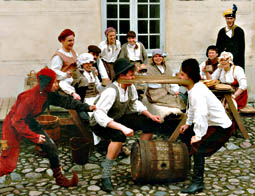Meet the Middle Ages
BackGames and sports

Throughout the ages, people have taken part in games and competitions. They did so in the medieval towns, too. When people had spare time, at feasts or at festivals, different kinds of sports and competitions took place. Wrestling, tug-of-war, running, jumping and testing one ´s strength were popular sports. The citizens had to be competent guards and fit enough to defend the town. Therefore, many did archery and crossbow shooting. In many towns, competitions in crossbow, running, jumping and skittle playing, were arranged. The competitions developed into popular celebrations, with parrot shooting at the end of the games. Then, the best shots would shoot down a parrot from a high pole.
Noblemen did other kinds of exercise. They wanted to be renowned for their skills on the battlefield. The highest wish a boys of the nobility was to be apprenticed to the King or a knight, and serve them as a squire. During the first years, a squire was just an assistant. Later on, though, he was allowed to exercise with weapons, doing fencing, bow shooting, crossbow shooting and throwing the javelin. Endurance and strength was trained by running, jumping, climbing, swimming and wrestling. To be a good horseman was vital to a squire or soldier. The squires and knights sometimes performed in front of the audience at tournaments. These events, sometimes quite dangerous, took place when a king or prince visited the town, or at a celebration.
Different kinds of backgammon and skittle games were well liked in town. Chess and Hnefatafel were like miniature battlefields. One had to show one ´s skills on the board instead of in war. The black and white pieces were equal to the struggle between good and evil.
Skittle playing and tournaments were common among nobles, town-dwellers and monks. At the end of the 14th century, card games were introduced in the towns. They soon became as popular as dice games. The law did not allow gambling for more than one mark at a game of dice.
You can read more about games under "Country Life.Workdays and Holidays".
Descriptions of different medieval sports and games can be bought at Kalmar Läns Museum.